This article was medically reviewed by Ricardo Correa, MD. Dr. Correa is a board certified Endocrinologist. Dr. Correa is the Program Director of the Endocrinology, Diabetes and Metabolism Fellowship at the University of Arizona College of Medicine and was a previous Assistant Professor of Medicine at Brown University. He completed his MD at the University of Panama and completed an internal medicine residency at the Jackson Memorial Hospital - University of Miami. He has been voted one of the 40 Under 40 Leaders in Health by the National Minority Quality Forum in 2019.
There are 12 references cited in this article, which can be found at the bottom of the page.
This article has been viewed 38,436 times.
Studies show that hypothyroidism occurs when your thyroid does not produce enough hormones, which upsets the balance of chemical reactions in your body.[1] The thyroid is an important endocrine gland that controls the body’s metabolism and is located in the front part of the neck just below your Adam’s apple. Experts agree that this condition, which is prevalent in women over 40, is hard to diagnose without a medical test, but it can usually be discovered relatively quickly via a blood test or a synthetic hormone injection.[2] Although hypothyroidism is prevalent in older women, it can also affect pregnant women, postpartum females, those experiencing menopause, newborn babies, people with autoimmune diseases, people receiving radioactive iodine or therapy, and people who have had radiation in the neck or upper chest.
Steps
Determining Who Should Get Tested
-
1Get tested if you see symptoms. Symptoms develop slowly over a number of years. Many of the symptoms can also be associated with many other types of conditions, but any combination of fatigue, increased sensitivity to cold, constipation, dry skin, weight gain, muscle stiffness or weakness, thinning hair, depression, and/or impaired memory will mostly likely lead you to hypothyroidism.
- If left untreated, hypothyroidism can become a serious problem. Physically, it could lead to a goiter and mentally lead to depression.
- Myxedema, or advanced hypothyroidism, is rare but can become life-threatening. Low blood pressure, decreased breathing, lowered body temperature, unresponsiveness, and a coma are signs and symptoms of the advanced stage that could ultimately lead to death.
-
2Test newborn babies. Because of the risk of intellectual disability in infants, get your newborn tested while still in the hospital. An early diagnosis, within the first month of life, will make it easy for your baby to reverse any effects of hypothyroidism. A simple blood test can detect the condition and then, once the proper medication is prescribed, your doctor will monitor the thyroid hormone levels with regularly scheduled blood tests. [3]
- Newborns who suffer from hypothyroidism will exhibit jaundice, frequent choking, a large, protruding tongue, and a puffy face.
- If the condition progresses, your infant may have trouble feeding, constipation, poor muscle tone, or be excessively sleepy.
- If untreated, hypothyroidism could lead to severe physical and mental underdevelopment.
Advertisement -
3Examine pregnant women. If you are pregnant or thinking about becoming pregnant then you should test your thyroid. Thyroid disease is common in women of childbearing age. Therefore, this condition could dramatically impact both mother and baby during the course of pregnancy.
- All pregnant women with an enlarged thyroid (goiter), family history of hypothyroidism, or high blood levels of thyroid antibodies should get tested.
- Ask your doctor for selenium supplementation if you have high antibody levels at the time of preconception.
- Women taking thyroid hormone replacement prior to pregnancy need to monitor their levels, especially during the first trimester. Doses might increase as the pregnancy progresses.
- After delivery (postpartum hypothyroidism), women may experience depression, memory and concentration issues, or thyroid enlargement.
-
4Watch for signs in children and teens. Children and teens will experience the same signs and symptoms as adults, but since they are still growing and have very active thyroid glands, they may also suffer poor growth resulting in shorter stature, delayed development of their teeth, slowed mental development, or a longer time period to enter puberty. [4]
- Children with hypothyroidism need to see a doctor regularly because, as they grow, the dosage of medication will change. Severe consequences may occur if the dosage is incorrect.
-
5Screen patients with conditions or exposures associated with high risk of developing hypothyroidism. People with conditions such as Down syndrome or Turner syndrome or those taking certain medications (amiodarone, lithium, thalidomide, interferon, sunitinib, and rifampicin) or treatments (radiation therapy to neck, radioiodine treatment, subtotal thyroidectomy), should be screened yearly for hypothyroidism.[5] [6]
Getting Tested
-
1Examine yourself at home. If you are exhibiting a combination of the symptoms associated with hypothyroidism, you might want to take some preliminary measures to determine if you have the condition. A noninvasive way of determining if you have hypothyroidism is to check your basal body temperature (BBT is your lowest body temperature in a 24 hour period) at home. [9]
- To get an accurate reading, you must take your temperature when you first wake up in the morning, before you even sit up in bed. Keep it under your arm for ten minutes.
- Perform this for four consecutive days and write it down. Your normal temperature should be between 97.8 and 98.2°F (36.6 and 36.8°C). If your temperature is below 97.8°F *(36.6°C), your thyroid could be underperforming. Check with your doctor of thyroid supplements.
- Remember, hypothyroidism cannot be confirmed as a condition with home testing alone. Only an official blood test conducted by your doctor can confirm any type of diagnosis. Even if home testing does not reveal hypothyroidism, you should remain wary since it is extremely difficult to detect and oftentimes takes several years to fully develop.
-
2Screen your family and medical history. Since many of the symptoms of hypothyroidism are common complaints found in people that do not have a problem with their thyroid, an intense, detail-oriented medical history is conducted by your doctor. Make sure you remember how long your symptoms have been bothering you. [10]
- Doctors will pay particular attention to whether you mother or a close relative was ever diagnosed with hypothyroidism. Try to find this information before going to see your doctor.
- Cancer survivors, especially those who received radiation around the neck, or neck surgery, will be closely scrutinized.[11]
- Another important red flag is medication that could cause hypothyroidism, such as amiodarone, lithium, interferon alpha, or interleukin-2.[12]
-
3Get a physical exam. A physical exam will take place after screening your family and medical history to check for symptoms. Your doctor will be checking for evidence of dry skin, swelling around the eyes and legs, slow reflexes, and a slow heart rate. [13]
-
4Take blood tests. If the results from your history and physical exams lead your doctor to suspect you have hypothyroidism or subclinical hypothyroidism, you will have blood tests to confirm the diagnosis. There are two main blood tests to confirm a diagnosis of hypothyroidism: Thyroid-stimulating hormone (TSH) test and the Thyroxine (T4) measurement. [14]
- If the tests come back atypical, anti-thyroid antibody tests may determine whether you have the autoimmune disease Hashimoto's thyroiditis, in which the body's defense system attacks the thyroid gland.
- Ultrasound is only used in rare cases to evaluate a thyroid gland that appears abnormal. Instead, a computed tomography (CT) scan or magnetic resonance imaging (MRI) of the hypothalamus or pituitary gland may be done to look for any changes in these areas of the brain.
Testing Positive
-
1Take drugs. Standard treatment for hypothyroidism is an oral medication that restores your hormone levels to their proper levels. You will need to take the thyroid hormone levothyroxine on a daily basis to reverse the signs and symptoms of hypothyroidism. After starting treatment, you will have regular visits with your doctor to make sure you have the right dose of medicine. [15]
- In most cases, your symptoms will begin to abate and you will gain some energy back two to six weeks after beginning treatment.
- Another benefit to this drug treatment is the lowering of cholesterol, which may reduce weight gained during the pregnancy.
- Infants and children with hypothyroidism should always be treated.
-
2Continue treatment. Taking levothyroxine is often for life, but the dosage size could become less over time. For older adults, the reverse happens. It is common that hypothyroidism gets worse with age requiring higher dosages because the thyroid slows down naturally. [16]
- Taking medicine everyday for the rest of your life is no easy chore and as physical symptoms disappear, you might be tempted to stop taking your medication. In this case, the symptoms will reappear and you will have to start all over again.
- The thyroid often returns to normal if the cause of your hypothyroidism was a result of a serious illness or infection.
- You may briefly stop taking your medication to see if your thyroid is functioning normally. If the thyroid can produce enough hormones by itself, treatment can end.
- Continue checkups annually while on medication.
-
3Think about the future. Be careful about which foods you eat and whether to take supplement or not with your medication. It is important that you continue to take your thyroid medication properly. If you are confused as to why you are taking it or the possible side effects, contact your doctor. [17]
- Avoid taking iron and calcium supplements with your medication because they reduce the amount of thyroid hormone absorbed by the body. Calcium supplements, however, can be taken prior to or after four hours of taking medication.
- Foods such as walnuts, soybean flour, and cottonseed meal should also be avoided because they could interact with your medication and, therefore, reduce its overall effectiveness.
- If you take birth control pills or other hormone medication, talk to your doctor about adjusting the dose of your medicine.
- Many health food stores carry “natural” ingredient thyroid hormone supplements. These products are unregulated by the Food and Drug Administration. Therefore, be wary of the quality and effectiveness of these products. Some do have active ingredients that work, but can still be dangerous to certain people. Consult your doctor if you are interested in these supplements.
Expert Q&A
-
QuestionWhat's the difference between hypothyroidism and hyperthyroidism?
 Damaris Vega, MDDr. Damaris Vega is a board certified Endocrinologist. She graduated Magna Cum Laude from the Pontifical Catholic University of Puerto Rico with a BS in General Science and subsequently earned an MD from the Ponce School of Medicine, Ponce, PR. During medical school, Dr. Vega served as president of the Alpha Omega Alpha Medical Honor Society and was selected as her school's representative for the American Association of Medical Colleges. She then completed a residency in Internal Medicine and a fellowship in Endocrinology, Diabetes, Mineral, and Metabolism at The University of Texas Southwestern Medical School. Dr. Vega has been recognized for excellent patient care multiple times by the National Committee for Quality Assurance and received the Patients' Choice Award in 2008, 2009, and 2015. She is a fellow of the American College of Clinical Endocrinologists and is an active member of the American Association of Clinical Endocrinologists, the American Diabetes Association, and the Endocrine Society. Dr. Vega is also the founder and CEO of Houston Endocrinology Center as well as a principal investigator for multiple clinical trials at Juno Research, LLC.
Damaris Vega, MDDr. Damaris Vega is a board certified Endocrinologist. She graduated Magna Cum Laude from the Pontifical Catholic University of Puerto Rico with a BS in General Science and subsequently earned an MD from the Ponce School of Medicine, Ponce, PR. During medical school, Dr. Vega served as president of the Alpha Omega Alpha Medical Honor Society and was selected as her school's representative for the American Association of Medical Colleges. She then completed a residency in Internal Medicine and a fellowship in Endocrinology, Diabetes, Mineral, and Metabolism at The University of Texas Southwestern Medical School. Dr. Vega has been recognized for excellent patient care multiple times by the National Committee for Quality Assurance and received the Patients' Choice Award in 2008, 2009, and 2015. She is a fellow of the American College of Clinical Endocrinologists and is an active member of the American Association of Clinical Endocrinologists, the American Diabetes Association, and the Endocrine Society. Dr. Vega is also the founder and CEO of Houston Endocrinology Center as well as a principal investigator for multiple clinical trials at Juno Research, LLC.
Board Certified Endocrinologist Hypothyroidism occurs when your thyroid doesn't produce enough hormones, and hyperthyroidism occurs when your thyroid produces too much hormone.
Hypothyroidism occurs when your thyroid doesn't produce enough hormones, and hyperthyroidism occurs when your thyroid produces too much hormone. -
QuestionWhat are early warning signs of thyroid problems?
 Damaris Vega, MDDr. Damaris Vega is a board certified Endocrinologist. She graduated Magna Cum Laude from the Pontifical Catholic University of Puerto Rico with a BS in General Science and subsequently earned an MD from the Ponce School of Medicine, Ponce, PR. During medical school, Dr. Vega served as president of the Alpha Omega Alpha Medical Honor Society and was selected as her school's representative for the American Association of Medical Colleges. She then completed a residency in Internal Medicine and a fellowship in Endocrinology, Diabetes, Mineral, and Metabolism at The University of Texas Southwestern Medical School. Dr. Vega has been recognized for excellent patient care multiple times by the National Committee for Quality Assurance and received the Patients' Choice Award in 2008, 2009, and 2015. She is a fellow of the American College of Clinical Endocrinologists and is an active member of the American Association of Clinical Endocrinologists, the American Diabetes Association, and the Endocrine Society. Dr. Vega is also the founder and CEO of Houston Endocrinology Center as well as a principal investigator for multiple clinical trials at Juno Research, LLC.
Damaris Vega, MDDr. Damaris Vega is a board certified Endocrinologist. She graduated Magna Cum Laude from the Pontifical Catholic University of Puerto Rico with a BS in General Science and subsequently earned an MD from the Ponce School of Medicine, Ponce, PR. During medical school, Dr. Vega served as president of the Alpha Omega Alpha Medical Honor Society and was selected as her school's representative for the American Association of Medical Colleges. She then completed a residency in Internal Medicine and a fellowship in Endocrinology, Diabetes, Mineral, and Metabolism at The University of Texas Southwestern Medical School. Dr. Vega has been recognized for excellent patient care multiple times by the National Committee for Quality Assurance and received the Patients' Choice Award in 2008, 2009, and 2015. She is a fellow of the American College of Clinical Endocrinologists and is an active member of the American Association of Clinical Endocrinologists, the American Diabetes Association, and the Endocrine Society. Dr. Vega is also the founder and CEO of Houston Endocrinology Center as well as a principal investigator for multiple clinical trials at Juno Research, LLC.
Board Certified Endocrinologist The signs change depending on if you have hypothyroidism or hyperthyroidism. When you have hypothyroidism you may experience fatigue, weight gain, hair loss, depression, high blood pressure, and dry skin. If it is hyperthyroidism, you may experience heart palpitations, anxiety, tremors, problems sleeping, weight loss, and hair loss or skin changes.
The signs change depending on if you have hypothyroidism or hyperthyroidism. When you have hypothyroidism you may experience fatigue, weight gain, hair loss, depression, high blood pressure, and dry skin. If it is hyperthyroidism, you may experience heart palpitations, anxiety, tremors, problems sleeping, weight loss, and hair loss or skin changes. -
QuestionI have a lump at the front of my neck at the bottom that I am told is fine. How would I go about having it removed? I believe it is a benign cyst.
 Lisa Bryant, NDDr. Lisa Bryant is Licensed Naturopathic Physician and natural medicine expert based in Portland, Oregon. She earned a Doctorate of Naturopathic Medicine from the National College of Natural Medicine in Portland, Oregon and completed her residency in Naturopathic Family Medicine there in 2014.
Lisa Bryant, NDDr. Lisa Bryant is Licensed Naturopathic Physician and natural medicine expert based in Portland, Oregon. She earned a Doctorate of Naturopathic Medicine from the National College of Natural Medicine in Portland, Oregon and completed her residency in Naturopathic Family Medicine there in 2014.
Licensed Naturopathic Physician If it's a cyst, you can schedule with a dermatologist. If it's a nodule on your thyroid, you will most likely need to consult with an endocrinologist.
If it's a cyst, you can schedule with a dermatologist. If it's a nodule on your thyroid, you will most likely need to consult with an endocrinologist.
Warnings
- If you are not sure if you have an underactive thyroid, do not hesitate to discuss this with your doctor. A blood test can help your doctor make a diagnosis. Failure to treat hypothyroidism can have devastating, even long-term or fatal, consequences that may get you later in life.⧼thumbs_response⧽
References
- ↑ https://www.mayoclinic.org/diseases-conditions/hypothyroidism/symptoms-causes/syc-20350284
- ↑ https://www.mayoclinic.org/diseases-conditions/hypothyroidism/diagnosis-treatment/drc-20350289
- ↑ https://www.nlm.nih.gov/medlineplus/ency/article/001193.htm
- ↑ https://www.nlm.nih.gov/medlineplus/ency/article/001193.htm
- ↑ http://www.thyroid.org/wp-content/uploads/patients/brochures/Hypo_brochure.pdf
- ↑ Garber JR, Cobin RH, Gharib H, et al. Clinical practice guidelines for hypothyroidism in adults: cosponsored by the American Association of Clinical Endocrinologists and the American Thyroid Association. Thyroid. 2012 Dec;22(12):1200-35
- ↑ American College of Physicians guidelines on screening for thyroid disease. Ann Intern Med 1999 Feb 2;130(3):246
- ↑ American College of Physicians guidelines on screening for thyroid disease. Ann Intern Med 1999 Feb 2;130(3):246
- ↑ http://www.niddk.nih.gov/health-information/health-topics/endocrine/hypothyroidism/Pages/fact-sheet.aspx#diagnosis
- ↑ http://www.endocrineweb.com/conditions/hypothyroidism/how-doctors-diagnose-hypothyroidism-0
- ↑ http://www.thyroid.org/wp-content/uploads/patients/brochures/Hypo%5Fbrochure.pdf
- ↑ http://www.thyroid.org/wp-content/uploads/patients/brochures/Hypo%5Fbrochure.pdf
- ↑ http://www.endocrineweb.com/conditions/hypothyroidism/how-doctors-diagnose-hypothyroidism-0
- ↑ http://www.mayoclinic.org/diseases-conditions/hypothyroidism/basics/tests-diagnosis/con-20021179
- ↑ http://www.mayoclinic.org/diseases-conditions/hypothyroidism/basics/tests-diagnosis/con-20021179
- ↑ http://www.niddk.nih.gov/health-information/health-topics/endocrine/hypothyroidism/Pages/fact-sheet.aspx#diagnosis
- ↑ http://www.mayoclinic.org/diseases-conditions/hypothyroidism/expert-answers/hypothyroidism-diet/faq-20058554
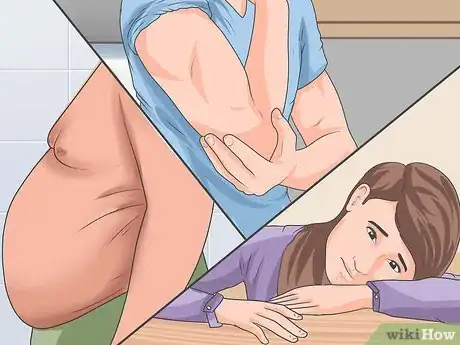
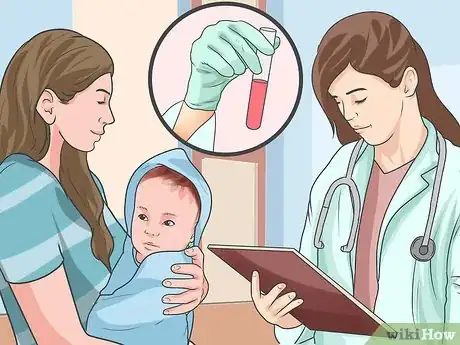
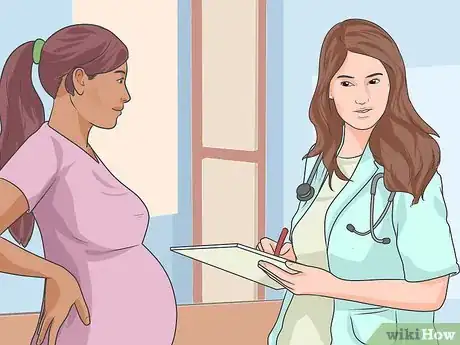
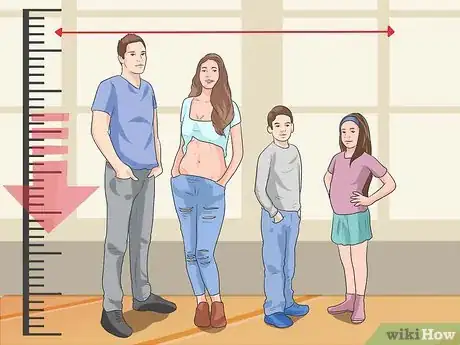
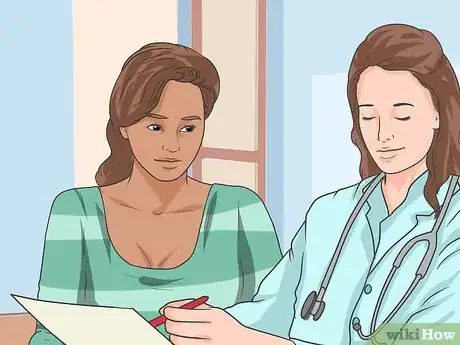
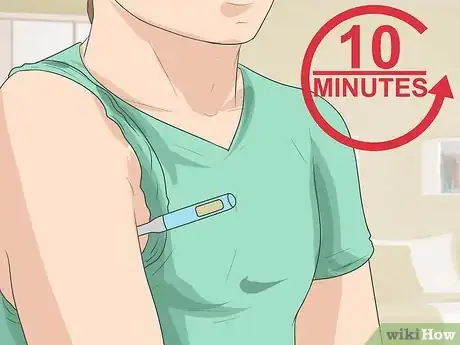
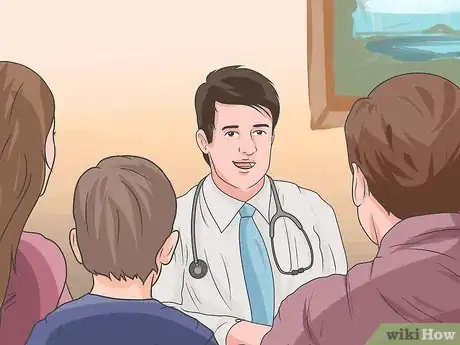
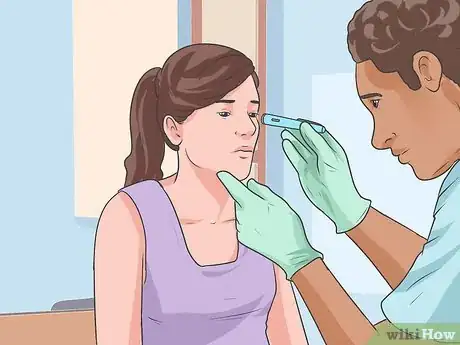
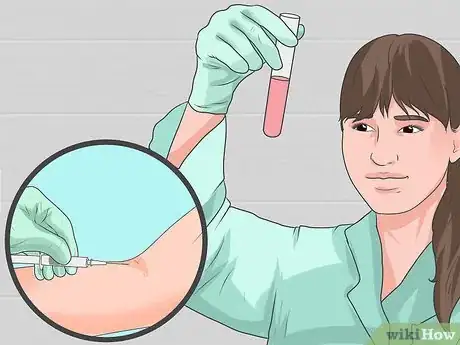
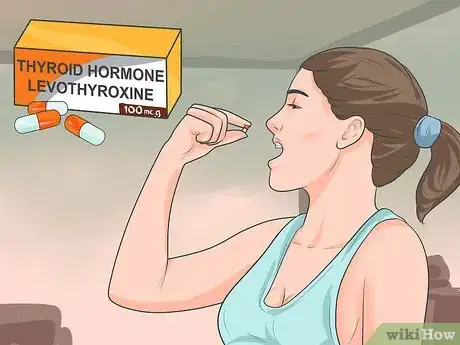
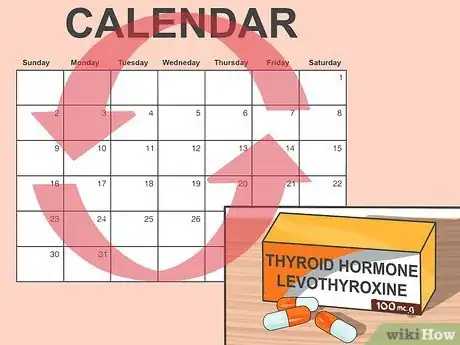
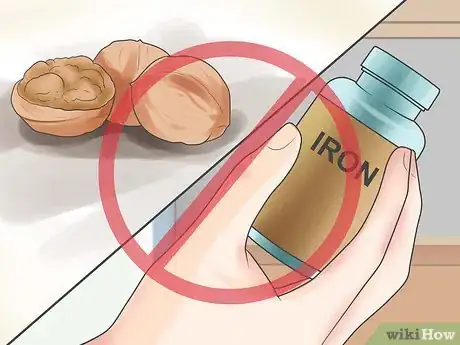
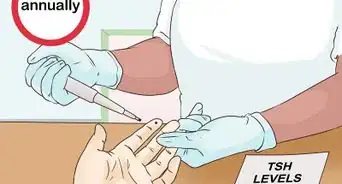
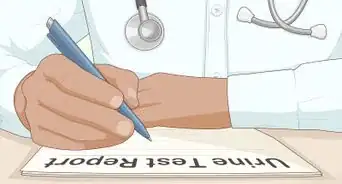
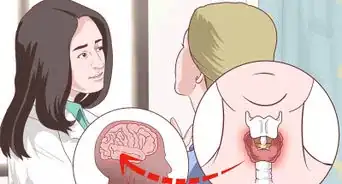
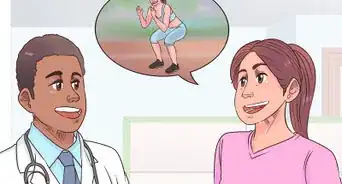


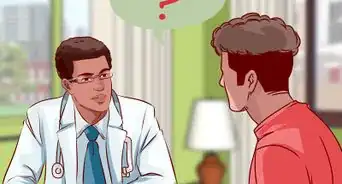
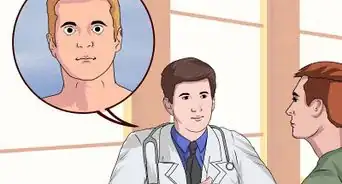
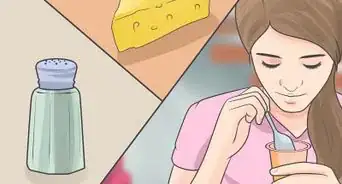

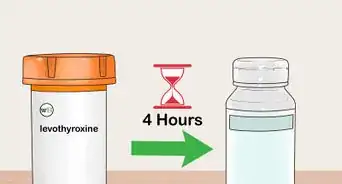
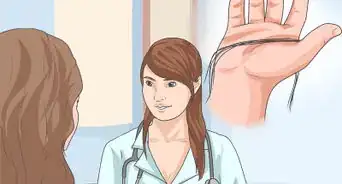
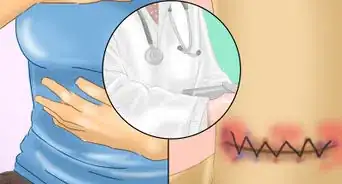
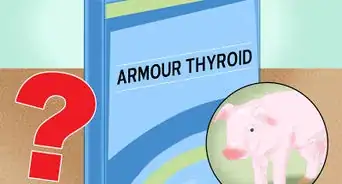
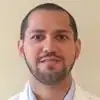






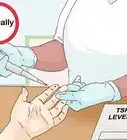

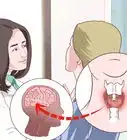
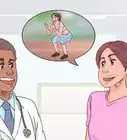



































Medical Disclaimer
The content of this article is not intended to be a substitute for professional medical advice, examination, diagnosis, or treatment. You should always contact your doctor or other qualified healthcare professional before starting, changing, or stopping any kind of health treatment.
Read More...